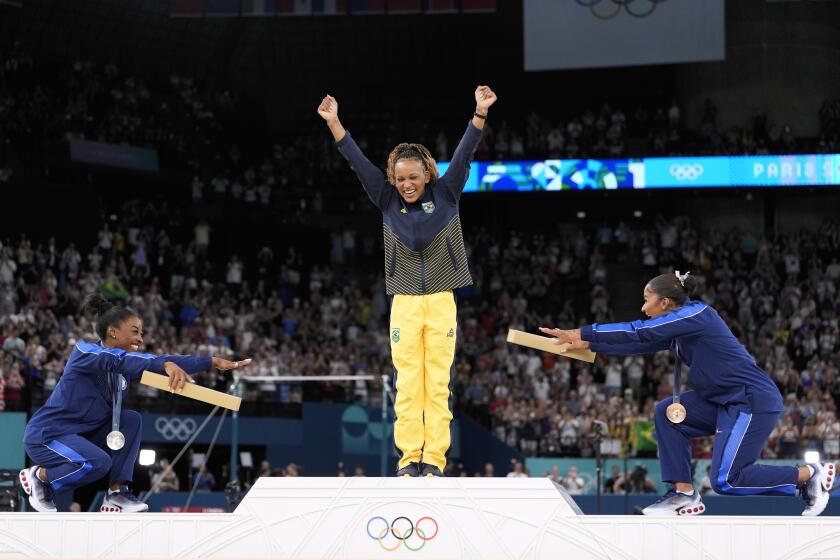Waiting for the Second Act
One sparkling summer day in 1984, I was taken on a boat ride with Peter Ueberroth. The L.A. Olympics were coming to a close, and Ueberroth was a man at ease. He already had signed up to serve as the next baseball commissioner, and before long would see his boyish grin spread across the cover of Time magazine--Man of the Year.
Ueberroth cut a golden figure that day in Long Beach Harbor, stretched out on the deck of an antique yacht, sharing secrets of how he and his helpmates created an event that would go down as one of the city’s shining moments. Looking back, it might well have been his high-water mark in public life.
He has made a lot of news in the decade since, and presumably a lot of money, but he never has managed to re-create that perfect match of talent and task that produced the summer magic of 1984. There was the baseball job and takeover bids, the flirtations with public office and time logged on various blue-ribbon commissions, but nothing so far to rival his Olympic glories.
Perhaps it’s like F. Scott Fitzgerald wrote: There are no second acts in American lives. Still, Ueberroth keeps trying. Which leads to his latest endeavor: Rebuild L.A.
*
I reached Ueberroth by telephone last Friday at his Idaho ranch, where he goes occasionally to lose himself in the role of gentleman farmer. He knew why I was calling, but wasn’t certain he was ready: “I need a little bit of time to get separated from this thing.”
This thing, of course, referred to Ueberroth’s announcement the week before that he was stepping down as the leader of Rebuild L.A. He attempted to cast this move as a strategic retreat rather than a surrender: He had become the focal point of out-of-control criticism, and it was detracting from the organization’s mission. He sought a less visible role, where he could quietly go about selling investors on the central city--”which is what I do best anyway.”
He talked about the unceasing political criticism of the fact that the city’s post-riot recovery was being led by a white, Laguna Beach Republican, about the failure of the federal government to contribute its share, and about a recent round of riot anniversary pieces that cast Rebuild L.A. as a ham-handed misadventure, a failure.
He seemed almost baffled by how it turned out, and frankly I could not blame him. At a time when the city was burning, he dutifully answered the mayor’s call, took an assignment with no pay and, from scratch, built an organization that in a year would raise half a billion in investments and contributions and, more important, persuade at least a trickle of mainstream businesses to cross the red line that surrounds American inner cities. This was Ueberroth at his best, a more important achievement certainly than 16 days of sporting fun, but all anyone with a note pad or political agenda wanted to know was this: What went wrong?
“I don’t think,” Ueberroth said, “that I have ever been involved with anything that is so successful--and have the success so unacceptable to the political leadership and, to a degree, the journalistic leadership.”
*
What happens to Rebuild L.A. now is anyone’s guess. From the start, even some of Ueberroth’s most ardent supporters wondered why it was not being run out of City Hall. Then again, didn’t they also try, for a short, fumbling while, to run the L.A. Olympics out of City Hall?
Ueberroth, though, remains convinced that it will thrive, that he was on to something big. “Every single inner city should have a Rebuild L.A.,” he said, “and they will.” Draw private enterprise back to abandoned neighborhoods, and it will discover there is money to be made. And as businesses come back, they will bring with them jobs, neighborhood stability, personal pride--”a renaissance,” he said. At least that’s the theory.
As for Ueberroth himself, well, he either will slink off to Laguna and console himself with making money or, hopefully, try once again to squeeze his foot into the glass slipper that once fit so well. He is one of the few interesting figures in California today, a complex mix of talent and ego, charisma and insecurity.
While his critics dismiss him as an overbearing bully, Ueberroth actually is quite capable of introspection, and these days he talks a lot about his grandchildren, about leaving them a greater legacy than Olympic torch souvenirs and fat trust accounts. Whatever his motivation, it is clear that he aches to do something great again, something golden. If only he could figure out what.
More to Read
Go beyond the scoreboard
Get the latest on L.A.'s teams in the daily Sports Report newsletter.
You may occasionally receive promotional content from the Los Angeles Times.








